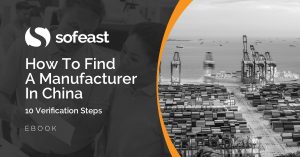When I meet someone who has recently started working with Chinese companies, I often urge them not to make any assumptions.
One of the most common ‘discoveries’ buyers make is… that they haven’t been working with a factory directly when they thought they were.
A common deception when sourcing from China
Here is what often happens:
- The purchaser researches Alibaba and has about an 80% chance of ending up with a trading company.
- The sales contact person keeps saying he/she works “at the factory”, but they don’t.
- The supplier’s company name (which will receive the payment) is that of the trading company. It usually doesn’t include the words “Trading” or “Import & Export”. (They still do NOT look like a manufacturer’s company name, but foreign buyers seldom know that.) Alternatively, that company is in Hong Kong or Taiwan and is presented as “the factory’s sales office, for greater convenience”.
- The purchaser does not research and is misled all along.
- The situation often becomes clear when things have gone wrong… and the whole supply chain needs to be re-built.
In some cases, we have seen a different situation:
- A foreign buyer contacts a real manufacturer.
- The manufacturer doesn’t have good English speaking skills and/or no export license, and asks a trading company to manage the order.
- Here also, the trading company doesn’t disclose the real situation.
“So, I shouldn’t work with a trading company?”
I am not implying that you should not work with a trading company. Maybe you should.
However, if they start the business relationship with this type of deception, you are probably in for a lot of trouble.
What can you do, to detect these situations?
Firstly, you can call your sales contact (even better if you can use video calling and you can see his/her face), and ask questions bluntly:
- ‘Do you work closely with a factory, or do you work for the factory?’
- If they say “for”, ask what their manager’s name is.
- Ask for the factory owner’ name.
Secondly, ask for the bank account information (if they don’t provide it willingly, push them and pretend you need to create their company as a supplier in your ERP system). And then, ask for their business registration certificate (it is in Chinese, but assure them you have someone who can read it).
Compare the information. Look at the registered capital and the authorized scope. Do some searches (I wrote details about this in 6 tips for background checks in China).
Factory auditing
Another effective approach is to ask for the factory address & phone number to arrange a factory audit. (Note that, if you can’t come and visit the factory yourself, you should definitely have an audit done.)
The auditor could take a photo of the factory gate (where their company name is usually written), ask a few questions, ask to see your contact person’s desk, and compare his/her name card with that of a factory manager.
Sometimes, in such cases, we also call a factory and get some details from their side. That’s the best way to have real information, in most cases.
If, for example, we reach a salesperson who doesn’t know her so-called colleague’s name, it is a red flag. (Except if the factory is very large, naturally.)
Your experience
Have you ever been misled, when sourcing from China, by a trading company posing as a manufacturer? What have you done to avoid these tricks? Any tips to add that fellow importers can use to detect a sales contact’s true situation before it’s too late?
Tell me by leaving them in the comments below, please.
Are you wondering how to find a manufacturer in China who is well-suited to your needs and can also deliver on their promises?
Sofeast has developed 10 verification steps to help you find the right manufacturer. They’re shared in this FREE eBook: “How To Find A Manufacturer In China: 10 Verification Steps.”
It covers:
- Background checks
- Manufacturing capabilities
- Quality system auditing
- Engineering resources
- Pricing, negotiation, & contracts
- …and much, much more
Just hit the button below to get your copy:



Once you are in direct contact with the factory, you should still check if the production is actually done there or if it is subcontracted. Then it would be the same as working with a trading company.
Great article, straight to the point !
This is also a common phenomenon in Dhaka, Bangladesh.